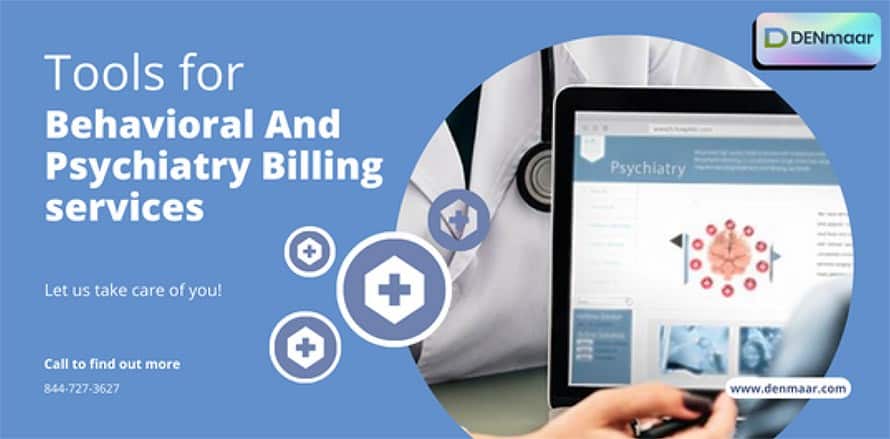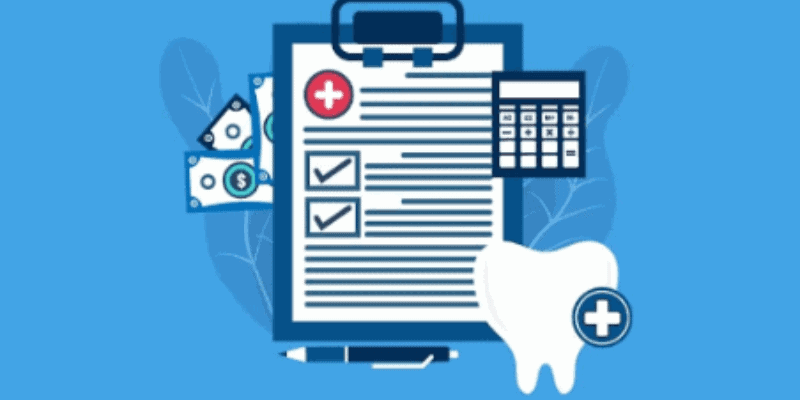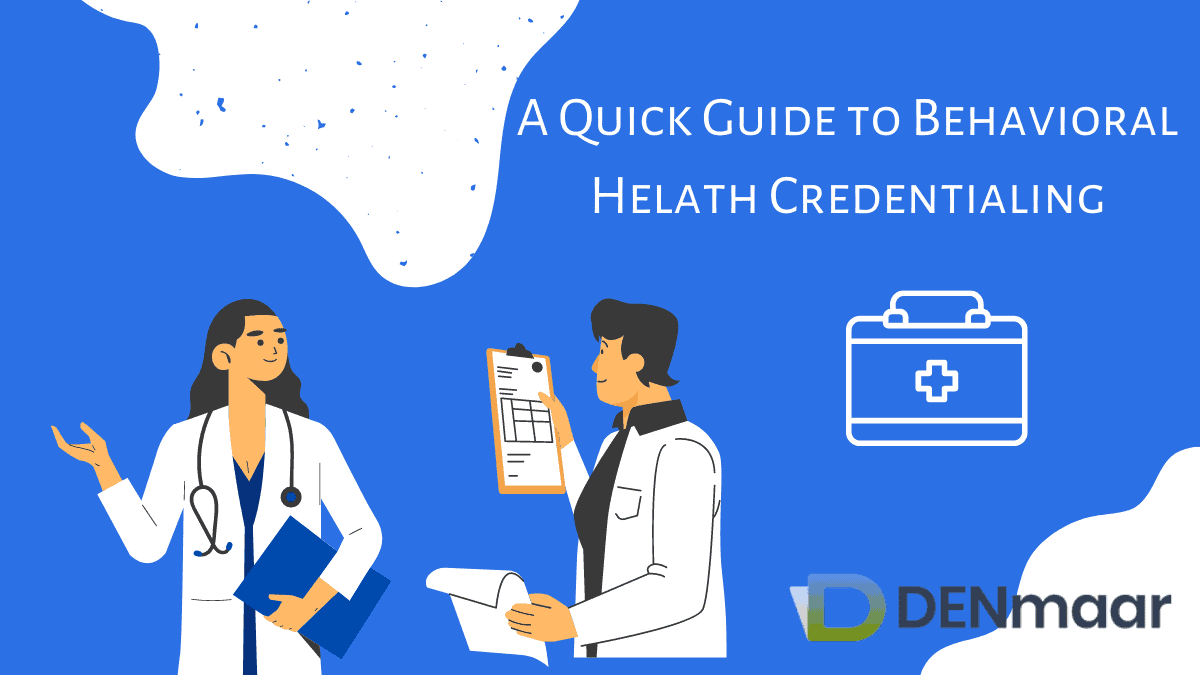
What tools are used for medical billing to manage behavioral and psychiatry medical billing services?
DENmaar provides a suite of mHealth IT solutions and services.
Since 2008 DENmaar’s sole objective has been to provide mental healthcare providers and practices with valuable services and tools to enable increased revenue, decreased administration time, and improved patient engagement experience. Utilizing internally designed IT systems built explicitly for the mental healthcare specialty
What tools are used for medical billing to manage behavioral and psychiatry medical billing services?
The field of psychiatry, medical billing, and mental health is unlike any other medical field. But analysis and diagnosis in the context of mental illness and treatment are more complicated to understand. Because of the complexities involved in treating mental and behavioral health problems, medical billing for psychiatry has become more complex than for other practices or fields. To effectively manage behavioral and mental health practices, it is necessary to know the various aspects and adjust the required tools and resources to help your billing team be available to patients who need them.
Having the right medical billing software is vital to ensure accurate billing. With the right tools, providers can streamline medical and behavioral billing requirements. It is also essential to note that there is no one-size-fits-all solution. Programs designed to meet specific practice needs enhance RCM and clinical practice.
DENmaar Revenue Cycle Management
Our behavioral health billing software harbors an RCM claims engine that allows mental and behavioral health practices to handle their revenue cycle management in a manner that ensures successful claims submissions and timely reimbursements.
Psychiatric medical billing services use the following tools:
Special coding
Medical billing for psychiatric and behavioral health uses special codes to ensure accurate billing. Codes created are not used by mental health professionals and are not included in the mental health billing process.
Sometimes systems slow down the billing process because medical health billing requirements are bypassed with previously submitted irrelevant information or data that cannot be used at the time of billing. The program, designed specifically for behavioral health and medical billing, comes with a list of frequently used codes. The program keeps updating codes that you don’t use for your practice. These codes are not completely deleted from the system but are acceptable when the invoice is issued.
Custom dashboard
In addition to prioritizing billing codes under a billing specialty program designed explicitly for behavioral, psychological, and mental health, billers must offer specific dashboards. Customized billing reports will show how your practice is progressing and how much effort it takes to create accurate billing that improves your practice’s efficiency.
Claim advertising tools
The more organized your claim, the quicker they will respond. As insurance companies begin to consider patients’ mental illness diagnoses, medical billing causes providers to accept insurance options for billing. High-quality software designed to meet the necessities of professional offer tools to ensure accurate billing for clean claim submissions, allow payment options for practitioners and verify insurance coverage before submitting the process.
Special services
Mental health clinic staff are often young, so outsourcing psychiatric billing claims to behavioral health may be the best option to focus more on patient health.
Coding expert
Suppose psychiatric medical billing coding is contracted to a trusted third party. It means you delegate billing authority to psychiatry professionals who are well-versed and knowledgeable.
Depending on your needs, programming experts are trained to provide up-to-date medical and behavioral health codes. When your staff is tired of billing for specific coding practices and meeting required standards, shifting the workload to your billing partner will help you stay on the cutting edge of technology.
Eliminate administrative responsibilities
Keeping billing staff in-house is expensive, and billing structures demand administrative responsibilities that require quick and often time-consuming actions. Outsourcing your medical billing to a trusted party removes the complexity of managing an in-house billing staff and allows you to focus your entire mental health on patients and services.
Claim Management
Medical-behavioral and psychiatric billing outsourcing enable first-time access to accurate claims, submission, reimbursement, or denial management. They open a single window for complete claims management that meets timely payment process optimization needs, ensuring that even rejected claims can be safely resubmitted when the entire billing process is handed over to a trusted party.
Outsourcing invoice approval services uses real-time claim tracking and filtering tools that don’t count rejected claims after course correction. After the separation of denial claims, corrections are made promptly to resubmit them before expiration.
DENmaar uses all the necessary tools for medical billing to manage behavioral and mental health. Full-service Revenue Cycle Billing services, authorization assistance, claims rejection, and denial resolution.
844-727-3627 Insurance Credentialing & Mental Health Billing Services (denmaar.com)
Learn More

What is an EMR system? What are the types, benefits, and features of an EMR system?
Electronic medical records
Electronic Medical Records (EMR) stores and retrieves patient records from your server, eliminating hundreds of manual files from your filing cabinet.
Electronic medical records (EMR) make it easy for doctors, nurses, and patients to access information quickly. You may think digital records are less secure than manual records, and you couldn’t be wrong. Since passwords and biometric scanners can be used to restrict access, documents become more confident. Recent growth in the use of electronic medical records (EMRs) has led to the development of services to transfer records from paper to digital files, which can be uploaded to the EMR system.
In general, EMR software records digital data that can be used to monitor and track patient health. Additionally, EMR systems provide the opportunity to review files remotely, with multiple people reviewing charts simultaneously, so that handwriting or other confusions that occurred in the past are no longer a concern.
How is it different from electronic health records?
Contrary to popular misconception, an electronic medical record (EMR) is not an electronic health record (EHR). Although both systems are similar in use and capabilities, they are not interchangeable for the needs of clinicians. An electronic health record focuses on the overall health of your patients. Electronic medical records usually do not comprehensively capture a patient’s medical history.
If patients change hospitals, clinics, or doctors outside their current network, they may not be able to bring their electronic medical records.
Medical offices can keep better and more secure records with the help of electronic medical record systems. Unlike electronic health record software, electronic medical records cannot be easily transferred. Compared to more robust EHR software systems, EMRs come with lower costs and fewer implementation challenges.
The choice between electronic medical and health records depends on which functions are most useful for the hospital, office, or clinic.
Main functions of EMR
Doctors and clinicians have more ways to record and use patient information with electronic medical records. Clinics and hospitals better control health data by replacing paper records with digital software. Electronic medical records (EMR) systems have several key features for physicians and their patients.
Simplified Charting: The information is stored in a secure digital space when a new diagnosis is made. You don’t need to manage multiple plans for multiple patient appointments. Additionally, you can read digital records more accurately and clearly.
Electronic Prescriptions: Most electronic medical records have electronic prescribing functionality, allowing pharmacies to receive prescriptions faster. Doctors can also get suggestions about drug interactions and dosage amounts with this feature.
Patient Portal: Medical information from electronic medical records can be directly accessed by patients. The most effective EMR systems provide secure online access to patients’ medical history, medications, lab results, and past hospital and clinic visits.
Decision Support: Most EMRs can benefit from a helpful patient portal built into them, with various functions that help patients manage specific aspects of their health care. The patient is informed about upcoming treatments, recommendations for particular procedures, and reminders about scheduled treatments.
Order Entry: Electronic medical records help physicians store and distribute lab test orders. With electronic medical records (EMR) systems, the system is less likely to be misplaced. Additionally, errors are filtered out of the system before they become problems. Healthcare organizations and patients save money and time in the long run by not having to repeat tests.
Advantages of electronic medical records
Healthcare providers can take advantage of the many benefits that electronic medical records provide. While this list is not exhaustive, it gives an idea of how electronic medical record software can improve patient care and record management.
Coordination of Care: The EMR allows providers to track patients’ progress from their first visit to their follow-up appointment. This picture is necessary for coordinating medication, therapy, and laboratory tests. All medical records will be available to patients to coordinate care with other clinics if required.
Improve patient care: Unlike paper records, doctors using EMR records can view patient information differently. Patient health outcomes are expected to improve in the long term. Weight, cholesterol levels, blood pressure, and other health data can be used to generate valuable charts through electronic medical records. The better information a doctor gathers over time, the better they can diagnose potential health problems.
Minimal Medical Errors: Patients and doctors can rest assured that their information is the most up-to-date and accurate with electronic records. Conversely, paper records can become missing or illegible, leading to misdiagnosis or incorrect prescriptions.
Efficiency: Healthcare facilities and clinics can operate more efficiently with electronic medical records. Administrative staff no longer need to file and store large documents in a safe and secure location.
EMRs also prevent doctors from recommending unnecessary tests to their patients. This simplification of information saves patients and providers money and time.
Types of EMR Software
Any hospital or medical provider can easily accept electronic medical records. You can choose from a range of electronic medical record system options. The choice of an EMR system ultimately depends on medical providers’ individual needs and capabilities.
Conclusion
Healthcare is an ever-evolving technology industry. Electronic medical record systems represent a way to improve the quality of medical care for many physicians and health care providers.
Although EHRs are more comprehensive than EMRs, EMRs improve health outcomes for patients. Doctors can periodically monitor patient data, schedule preventive appointments, manage medical treatments and monitor chronic diseases.
DENmaar’s medical EMR and EHR systems provide all the above benefits. Call us now!
Learn More
Top 10 advantages of outsourcing your behavioral health billing
Why Outsourcing Your Behavioral Health Billing Is Beneficial
Healthcare is complicated, especially with many regulations that constantly add additional layers. Healthcare providers spend more time and resources organizing patient care and can use this time better. Using a qualified, outsourced behavioral security billing company can serve you well while reducing your workload, experiencing less disruption, and increasing your profitability.
10 Benefits of Outsourcing Your Behavioral Health Bills
1. Reduce staff costs.
When you outsource behavioral/mental health billing, you are not responsible for employee health care, acquisition costs, PTO (Paid Time Off), and other employee costs. The resources required to manage the behavioral health insurance process are high. Another point of using this behavioral billing solution is the cost-sharing model. It allows billing costs based on your size and revenue. It is advantageous if you have a low-income month; no fixed price will be associated with your billing.
2. Improve the revenue cycle.
As behavioral health providers’ legal and administrative terms grow and the claims process becomes more complex, working with a skilled and trained behavioral health billing company can provide significant relief. RCM, or Behavioral Health Revenue Cycle Management, is a specific application explicitly designed for practices that treat patients with behavioral issues. It helps with payment methods and claims processing more than a generic billing app. It will significantly improve revenue cycle management.
3. Keep patient data secure.
Internet security is one of the main concerns preventing doctors from outsourcing medical billing. Protecting patient and practice data is critical. All professional medical billing companies are responsible for safeguarding all patient information (HIPAA compliance).
4. Reduce employee errors.
Even the most minor fatal mistake can cause an insurance company to deny a medical billing claim; someone on your staff will correct the error, resubmit the application and wait for the revised application to be accepted and processed. Working with a specialized provider reduces employee errors, as they have more experience working with invoicing and have gone through a much greater training process than your in-house team.
5. More consistency.
Due to unplanned staff changes or staff absences, internal billing is at high risk of disrupting your practice revenue. Our outsourced medical billing services provide an entire team of experienced people to ensure your claims are prepared efficiently, reducing the likelihood of disruption to your practice cash flow.
6. Better handling of claims.
Prompt and accurate payment of each insurance claim is essential to optimizing the medical office’s cash flow. Time is precious, and healthcare workers typically do not have the luxury of reviewing and following up on every claim. Let’s face it, healthcare professionals and their support staff are often pulled in different directions. But you must submit these claims as quickly and accurately as possible the first time. Otherwise, unpaid claims can quickly deprive the office of resources you can apply elsewhere. Forcing you to make numerous phone calls to insurance providers only wastes more time and increases frustration. Healthcare providers should consider outsourcing this function to reduce the administrative burden on support staff. Good medical billing companies are quick, consistent, and accurate in filing and processing insurance claims.
7. Transparency.
Others think outsourcing billing means relinquishing control and power to your practice, but that’s only partially true. When you outsource billing, you get more control and transparency. You may review the data collected or monitor the processing at any time at your discretion. It gives you an up-to-date assessment of how and when to handle your clinic bills.
8. Increase profits.
Due to inefficient, inadequate, or incorrect claims, medical providers lose revenue. However, this is not the case if you outsource billing to a pool of eligible behavioral health billers.
These outpatient behavioral health billing professionals are simply experts and far more skilled than your in-house staff. They are adept at handling appeals and reversing denials. They have the insight and experience to identify specific areas of weakness, reduce recurring claims errors and ensure more claims are completed (paid) on the first attempt.
9. Knowledgeable.
Behavioral health external billing solutions come with a wealth of knowledge. They understand the various intricacies of invoicing insurance and know to check trends and spot industry shifts. Longevity is not unusual in this niche area; However, it is necessary. The results from longevity and experience are priceless. Understanding historical trends for each insurance company, the amount paid, accurate printing of documents, etc., can significantly impact your BHO’s ability to collect insurance.
10. Fast action.
Automating routine administrative tasks makes your work more productive and valuable. Automating the same-day claims submission process will increase cash flow. A certified paper claim can take at least two months to travel through all channels before you receive payment. Submitting a clean claim, properly coded for maximum benefit and supported with electronic health records, can result in full reimbursement in a shorter period.
Conclusion
There are many great reasons to outsource your behavioral health bills to a professional group. It makes sense to outsource revenue cycle management services to a third party, which puts less strain on your internal resources. DENmaar provides behavioral/mental health billing services to many behavioral health treatment centers and has many years of experience.
We, DENmaar, can provide these services quickly and affordably, with all kinds of benefits that will accrue to your practice. It has a skilled team of billing and certification professionals dedicated to your medical practice with the expertise in medical billing, accreditation, EMR, and EHR you need. Call us now!
Learn More
Medical Insurance Credentialing: Everything you need to know to avoid losing money and clients
Accurate and timely acceptance of medical insurance is essential for obtaining payment from insurance companies. It’s complicated, time-consuming, and can cost thousands of dollars if you get it wrong. That’s why it’s important to partner with a medical billing company that has experience and a proven track record of success.
What is Medical Insurance Credentialing?
Insurance companies check that medical providers are legitimate and eligible to be compensated for services rendered. When a particular payer credentials a service provider, they can bill the payer directly and receive compensation.
What types of medical professionals require credentialing?
Every practice you want to bill an insurance company for must be approved. These include hospitals, clinics, doctors, dentists, physical therapists, behavioral health therapists, optometrists, etc. The term “In-network” (inside the network) means that the provider is currently credentialed by a particular insurance company and is eligible to file claims for reimbursement.
How difficult is it to get credentialed?
It is very complex and time-consuming. It usually takes 20 hours or more to apply to a single-payer. Every country has different needs. Specialists may also require unique documents. These variables make it effortless to miss a step, add the wrong document copy, or make a mistake.
Why are credential errors so common?
Even the slightest mistake in the credentialing process results in claims being denied, which means significant delays in the provider’s revenue stream. Timing is important.
What are the requirements for the credentialing
Providers have 30 to 90 days to submit the claim after the day of service, depending on the state and purpose. Then, the payer has 90 to 120 days to file that claim. If the claim is rejected and resubmitted, the waiting period starts again. But denying a claim does not reset the 90-day clock for payment. Providers may experience timely application problems if they see patients not credentialed adequately by payers.
Are there other ways providers lose money due to credentialing errors?
Large payers may make up a more significant percentage of a practice’s revenue. If most of your claims are delayed for three months, you may not have enough income to keep the doors open. You may need to stop seeing customers until the problem is resolved. On the other hand, they could not recover the lost revenue due to the expiry of the application period.
How most credentialing systems do manage?
Medical practices typically hire one person to handle the credentialing process, which involves gathering about 20 different documents, ensuring the data is accurate and submitting them one by one to other payers. This person will ideally be responsible for re-credentialing in subsequent years. But if that person leaves, gets reassigned, or even gets busy and forgets the approval order, organizational knowledge is lost, and the deadline is missed.
So many practices choose to use credentialing software or outsource the tasks to a billing company that provides this service. Outsourcing to a credentialing service such as DENmaar is an easy way to manage the process.
Why an outsourcing dependency task is better than doing the in-house with dedicated software?
Credential programs are expensive, making them out of reach for most small practices. Although users are limited to most of the tracking features, users complain that the software is challenging to locate. For example, you may fail to set it correctly and miss the re-credentialing window.
How have credentials changed since COVID-19?
The pandemic has changed the healthcare landscape, especially in behavioral health. Many new patients sought treatment and demanded that providers accept insurance. Previously, small clinics could only get away with cash services. Suddenly, they had to get credentials to fill a genuine medical need and didn’t know how to do it.
Another significant change in credential requirements was telehealth. Before the pandemic, there were not many methods of providing telehealth services, and therefore no billing processes. Then almost overnight, telehealth became ubiquitous, and its payers imposed new requirements.
In addition, telehealth allowed behavioral health providers to see more patients daily, and it took more time for a provider to do their billing or manage credentials.
How can clinics lose patients because of credentialing
Let’s say your staff forgot to re-credential, and all your claims are denied. Rehabilitation takes 3 to 4 months. During that time, you have two terrible options. You can look after patients for free until you are credentialed. It causes a massive loss of income. Or you can close your clinic or hospital for a while. You cannot blame them for going elsewhere for treatment.
Where to get the best insurance credentialing services?
Looking for insurance credentialing services? You’ve come to the right place! Here at DENmaar, we provide the best insurance credentialing services in the business – and at prices that are more than reasonable. Give us a call today!
Learn More
Billing to Medical Insurance: In-Network Vs. Out of network
Many health care providers are not recognizing that they can increase profits and save patients’ costs by paying medical insurance bills.
One of the most common questions many medical/dental billing specialists in a medical practice hear is: “Do we need to be in-network for medical insurance billing?” When dealing with this question, there are many things to consider, but the answer largely depends on the following question: What type of medical insurance policies do you want to pay for?
Types of Insurance
There are many types of insurance. Health maintenance organizations (HMOs), exclusive provider organizations (EPOs), and preferred provider organizations (PPOs) are the most common.
HMOs and EPOs are similar in that these plans require you to be in network (IN) to be billed, as they do not allow the patient to see any provider out of their network (OON).
Sometimes they allow the patient to see an OON provider if they are in an emergency. An example is a patient with severe pain from an abscessed (infected) tooth or some trauma. The HMO/EPO may initially deny service to an out-of-network provider; however, they may pay if you appeal the claim.
If they agree to pay, these schemes will do your work to get paid. OON methods can avoid billing for these types of preventative plans.
Most residents have PPO-type medical plans. PPO plans offer in-network and out-of-network benefits to their insured patients. There is a difference in how benefits are paid to an OON provider versus an IN provider. For example, if 80% is delivered to an IN provider for a procedure, it is usually paid 60% or less to an OON provider.
Discounts are another significant factor. It is essential to know that not all actions apply to the opponent. An example of this is ratings.
Tell your patients that their drug payments will begin after the deductible is met. You’d be surprised how many processes don’t apply to deductions. One of the significant variables will be plan quality. There are good and not-so-good dental policies, but the same goes for medicine. You do get what you pay for.
This benefit reduction is not reflected in most practices as allowances (the amount allowed for a procedure/service) are much higher than for dentistry (which is included in the contract fee schedule). Most procedures cost double what dental policies pay for.
Credentialing with medical insurance
Getting approved for access to IN medical insurance is similar to getting approved with dental plans. It is vital to ensure that the medical carrier understands that you intend to engage in IN medical services, not dentistry and that you provide many services that do not include dental treatment and are more medical. However, you may find that many medical plans only allow oral surgeons to go IN.
Numerous dental practices are ignorant that in some states if you are IN with dental, you’re automatically IN with medical. In this case, you could easily bill medical and be refunded more than double for your services. It helps provide dental benefits to patients for dental procedures. You can bill both medicine and dentistry; They are separate policies that your patients pay for and have benefits.
Medical bills are here to stay. There are many services you offer that may be billed for medical services, such as evaluations, surgery, sleep, or TMJ treatment. Whether in IN or OON, being strategic in your approach will grow your practice group and lower your patients’ out-of-pocket costs.
Who provides the best medical insurance credentialing Services?
Since 2008, we, Denmaar provide mental health care and practices with valuable services and tools that enable increased revenue, reduced management time, and an improved patient engagement experience. Using an in-house IT system explicitly designed for the mental healthcare specialty, unparalleled efficiency allows us to deliver our services at lower than typical medical care rates.
Learn More
Is mental health billing obstructing your treatment process?
Mental health services billing is more complex than in other areas of health care due to the type of services, timing, scope, and limitations of mental health treatment.
For instance, if a patient goes to the doctor for a routine checkup, he will almost certainly have a standard series of tests and exams. It usually involves measuring the patient’s height and weight, taking their blood pressure, and listening to their heart. These tests are, for the most part, standardized for all patients, take the same amount of time, and have slight patient-to-patient variation.
Similarly, when providers bill health insurance companies for regular checkups, the billing is uniform, recurring, and often bundled into a single fee. However, the same cannot be applied to mental health treatments.
That’s why a mental health care provider must have a streamlined mental health billing process that permits you to concentrate on what’s essential – caring for patients with the best treatment. Here are some mental health billing challenges in the treatment process and well-proven tips for handling them.
Challenge 1: Denied or delayed claims
Sometimes it can be challenging to collect payments for services rendered. The more insurance companies delay making necessary payments, the harder it will be to collect the money you need. Fortunately, instead of facing the challenges of accepting claims regularly, there are several steps you can take to ensure you continue to receive the claims you deserve in a consistent and continuous stream.
Solution: Identify procrastination and how to avoid it
Learn about potential claims delays, including the most common delays with insurance companies. Insurance companies will mostly not accept a claim exceeding the maximum amount allowed on the policy. If you expect this will be a challenge, you should review how the insurance company is billed to ensure you don’t exceed the limit. Coding problems, which can be easily avoided by working closely with a billing professional specializing in mental health, can help facilitate approval and ensure you receive your payments on time.
At last, consider accepting cash payments from patients who may or may not work with certain insurance providers, which can help facilitate payments and keep your clinic running smoothly.
Challenge #2: Patient Insurance Changes and Pre-Approvals
Patients are seeking mental health care regularly schedule appointments and services. Some people may have the same insurance for years, making providing mental health billing for services relatively easy. Any change in insurance may result in your claim being denied, leaving you with uncollected payments. Similarly, the necessary care will not be provided if an insurance company offers treatment to a patient without prior authorization. It may eventually leave the patient unable to afford these services, resulting in lost appointments and revenue opportunities.
Solution: Check insurance coverage and requirements
When a new patient makes their first visit, check with their insurance company to ensure they don’t need special approval steps. Continue to check your patients’ insurance and coverage at each visit, and remind regular patients to notify you immediately if their insurance changes.
Our state-of-the-art EHR platform can help you quickly and easily determine whether a patient has the necessary coverage to complete an appointment. If your patient does not have the insurance coverage required for the appointment or cannot check insurance, you may need to reschedule.
Suppose you were previously an in-network provider but moved out of the network or to a different network tier for a particular provider. In that case, you may need to notify your patients. Make sure this happens before their appointment to give them enough time to sort through any potential insurance or payment changes.
Challenge #3: Insurance Company Presentation Preferences
Nowadays, most insurance companies utilize a digital billing model. But, this does not mean that every company prefers the same registration method. Your employees may be forced to keep changing preferences — and if you file incorrectly, you may struggle to collect payment from that insurance company.
Solution: Collaborate with a professional medical billing specialist
A dedicated mental health billing specialist can help you stay abreast of the ongoing changes in the insurance industry, including the changes many companies are making. Your mental health billing specialist will grow and change your practice with varying needs, ensuring insurance claims are submitted correctly so you can collect payments more efficiently.
Outsourcing mental health medical billing to a third party
As you can see, a lot of work is involved in adequately filing claims for mental health providers. Thus, it’s not surprising that many providers prefer to use a third-party mental health billing company to handle claims so they can focus on patient care and treatment.
Denmaar works 24/7 with mental health providers to provide pre-authorization, billing, and mental health medical coding, follow up on claims and assist with appeals of insurance claims. Check out our mental health billing and coding services, and contact us immediately if you think this is the best option for your facility.
We, Denmaar, have demonstrated our expertise in various fields by implementing uniform quality and timely strategies to improve multiple practices. They have the best experts who closely monitor the accounts and ensure that all medical bills and coding confusions are addressed with practical solutions. Call us now!
Learn More
Tips to reduce contradictions of mental and behavioral health
Medical billing is a complex process in which medical billing for mental health services is more complicated than ever and comes with unique challenges. Many services are covered under mental health, such as pre-authorization, anxiety dissipation, size and availability of office staff, and mental and behavioral health bills that cater to more disadvantages.
Mental health bills
One of the best factors is paying more attention to patients to understand the mental and behavioral health billing process. In addition, refusal management is a good reason to increase the importance of medical billing for medical professionals. In this blog, we will look at how and why mental health bills are complex and difficult to handle and what can be done to reduce billing claims rejection.
Why are mental health bills so difficult?
Consider other areas of medical billing. You may see some standard procedures followed due to specific treatment and recovery periods, but this may not be the case with mental and behavioral health. Factors such as time, service variables, scope, and mental health treatment limitations make them more complex and ambiguous.
As counseling and billing vary from patient to patient, providers may have difficulty billing and making claims as the causes may increase in patients.
Best practices for mental health care billing:
While the billing process for mental health services is difficult to handle, providers follow these tips to simplify their approach and system.
# 1: Double-check insurance and coverage for the patients
Since the patients have their insurance cards, providers can quickly check the benefits of their policy and whether the services they use are included in the policy. It also lets the providers know how much the insurance company pays the patient for the service.
# 2: Understanding CPT Code:
If the CPT (Current Procedural Terminology) codes are not specified properly, there is no point in doing the whole process properly. These signs show how much you will have to pay for certain healthcare services delivered to patients. Unlike other medical billing procedures, you will not easily find CPT codes for mental health and billing. Standard CPT codes are not used for cognitive and behavioral health bills; Instead, they should contain specific E / M codes and the corresponding CPT codes.ce coverage considering the status of waived cases; Reclassification of neglected cases; Offer details.
Your payment mental health billing claim form looks in three ways: history, examination, and medical decision-making.
History contains details of current illness, past family and social history, and repetition of rules. The examination section covers the type of tests to be performed, the nature of the problem, and the patient’s history. Finally, the column for medical decision-making includes the number of diagnoses or treatments made by the patient, the complexity of the data, and the risk of complications.
CPT codes play an important role in rejecting mental health bill claims; Therefore, practitioners/hospitals should remember that updating their system quickly with CPT codes can help overcome complaints related to mental health bills.
# 3: Learn how to submit claims properly
Just as the symbols in the claim form are important, it also makes sense to understand how to fill out each column on the claim form. You need to go through the full procedure at the beginning, and before filling out, if in doubt, clarify this with the expert involved in submitting the claim and then proceed to fill out and submit the form.
Conclusion
Outsourcing your medical billing and coding process is a wise choice to make your mental health billing process easier and reimburse you without denying any claims. Contact the best medical billing and coding outsourcing company, “Denmaar,” which offers high quality, support, and maximum refunds in medical billing and coding.he benefits and skills of mental well-being before seeing a patient. The attachment will emphasize the limits of normal division; deductible, visits per year allowed, any membership requirements, and Case Street numbers.
About Denmaar’s medical billing service:
We are a medical billing company that provides medical billing services and supports doctors, hospitals, medical institutions, and group practices through our comprehensive medical billing solutions. We help you earn more through our fast and affordable services. In addition, our customized Revenue Cycle Management (RCM) solutions allow physicians to increase additional revenue and reduce administrative burdens or losses.
Learn More
What are the benefits of behavioral and mental health billing services?
Our billing solutions experts can help you if you seek assistance for your rising mental health fees. Join affiliated psychiatrists, counselors, and social specialists to offer a system for influencing your mental health needs. As much as they are skilled, they are passionate about prosperity and providing their clients with special treatments and caring associations.
Custom behavioral Billing Service Measures
Since trained professionals charge your accredited operational success on the subject, they work with professionals, specialists, educators, and social workers to deliver predictable matches to handle your readiness — in all moderate psychology billing services.
They will help manage patient onboarding, board costs, and every part of your shipping charges. In addition, it will certify patient benefits, submit charging and give clarifications, and work with safe workplaces depending on the situation.
Processing of cases
Entering the patient’s financial problems and confirmation data; Checking the availability of records; Submitting claims electronically whenever permitted are processed.
Posting segments
Introduction of sections for changes and publication of patient payment is performed.
Cash report
Access 30 reports on the financial strength of your rankings. Forms include confirmation creation, patient creation, monthly and reliable frameworks, and reimbursement assessments for various payments.
Follow up and restart
Taking out insurance coverage considering the status of waived cases; Reclassification of neglected cases; Offer details.
Online access to information
With our online framework, suppliers can check things with neglected cases, find coordination, and run cash reports throughout the day. Useful when there is no opportunity to email or call the office for requests.
Insist on benefits
They call safety workplaces to show the benefits and skills of mental well-being before seeing a patient. The attachment will emphasize the limits of normal division; deductible, visits per year allowed, any membership requirements, and Case Street numbers.
Practice management measures
Mental health billing services include:
Confirmation of Benefits:
Confirms that sharing, discounts, and unconditional visits are allowed every year.
Record Management:
Mail outpatient data and respond to patient registration requests.
Case Management:
Call insurance associations to consider the status of rejected cases, resubmission of claims, and rejection.
Learn More
A Quick Guide to Behavioral Health Practitioner Credentialing
The following article will tell everything you need to know about successfully getting on an insurance panel as a mental health practitioner.
This goes without saying but getting on an insurance panel is no easy task and can be incredibly frustrating, especially for mental health practitioners with already a lot on their plate. One way to make the credentialing process less overwhelming would involve being aware of certain fundamentals related to the arduous but necessary task.
That is exactly what we at DENmaar aim to do with the help of the below guide. So, without much further ado, let’s get started.
Finding Reputable Insurance Panels
By now you must be aware of all the health insurance companies active in your city and state. From large brands like Cigna to national entities like Medicare, it would be wise to keep a note of all these names before you start the credentialing process.
We would recommend making a spreadsheet that includes all of these companies. Moreover, expand your search by contacting your professional network. If you aren’t sure how many insurance companies are active in your state, then doing a quick Google search will provide the answers you need.
Make sure you note down the contact and address info of each of the insurance companies you find online. Save this information on your spreadsheet. Learn about the conditions regarding provider credentialing that apply to each specific company and make a note of them as well.
Learn About the Requirements of Insurance Companies.
Insurance companies are constantly on the lookout for reliable practitioners for their panels. You must make a good case about your skills and strengths as a mental health practitioner in your application.
Below are a few things that insurance panels seek in their applicants.
1. Location
Insurance companies look favorably upon practitioners who are actively serving patients in an under-served location. Your chances of getting on an insurance panel skyrocket if you are operating a clinic or practice in an area where that isn’t adequately populated with healthcare providers like you offering their services.
2. Cultural Diversity
Do not forget to mention your ethnic background, especially if you belong to an atypical one. Also mention if you speak multiple languages. These defining characteristics will increase your chances of getting on an insurance panel.
3. Qualities and Specialty
Make sure to emphasize the training and educational qualifications you possess. Do not forget to mention your specialties, especially when you specialize in offering healthcare to kids, elders, and LGBT or minority members of society.
4. Crisis Therapy
Insurance Panels are likely to look favorably upon healthcare providers that respond to emergencies quickly.
The above factors make you stand-out, and as such, should be emphasized in your application to increase your chances of getting successfully credentialed. We recommend making a list of everything that makes you stand out among other mental health practitioners in your vicinity before undertaking the credentialing process.
Create a Good Resume and Letter of Intent
You need a good, comprehensive resume that highlights your skills and accomplishments. Follow the below pointers to create a compelling resume and letter of intent.
- • Make sure your resume is short. One page is more than enough
- • Focus on things that make you unique rather than mentioning things that anyone can do.
- • Always use short sentences
- • Form sentences in active voice
- • Do not misrepresent your skills or lie. Also, do not undersell yourself.
The following format will make for an ideal resume:
- • Contact information, License number with date of issue.
- • Statement of intent
- • Credentials, skills, specialties, educational qualifications
- • Mention job experience. Include references to the organizations you’ve worked with, in the past.
- • Include additional skills like the ability to speak multiple languages, etc.
The letter of intent is another thing you must be careful about when composing. You want to be distinguishable while portraying yourself in good light. The below format would make for an ideal letter of intent.
- • Clearly state the name of the insurance panel you want to be on.
- • Mention your credentials and educational qualifications
- • Explain what makes you stand out among your peers. This could be language, culture, availability, etc.
- • Mention if you have clients that are already on that panel and are being billed out of network.
- • Close your letter by letting your intentions and desire to join the panel crystal clear.
Finally, Apply to the Insurance Panels
Now that you are prepared, it’s finally time to submit your application.
- • Mail your resume along with the letter of intent to the appropriate application address.
- • Note down the date on which you applied.
- • Call the application office exactly one week after submission for confirmation. Note down the name of the representative that answered your call for follow-up and mention the date you called on.
- • Confirm the next steps and also ask when you can follow up next.
- • If for some reason your application is rejected. Do not be heartbroken and be ready to re-apply immediately.
Conclusion
Getting on an insurance panel is tough but not impossible. The above guide will considerably simplify the process for you. To make the process even more hassle-free, we recommend you give us at DENmaar a call. We are home to the credentialing experts and resources needed to help you get on an insurance panel effectively and efficiently.
You can explore our website or contact us now to learn more about how we can help with mental health insurance credentialing.
Learn More
How to overcome the challenges in medical credentialing
How to overcome the challenges that medical credentialing faces?
Medical credentialing is one of the most critical compliance issues in medical practice today. However, this is a time-consuming and complex process to do it properly. A poor medical credential can lead to registration problems and legal and financial complications. Do you know what weakens the medical credentialing process? Here are the top 4 most common medical credentialing challenges that every practitioner should be aware of and solutions to overcome those challenges in the credentialing process.
What is medical credentialing?
Medical credentialing is the process of verifying and evaluating the eligibility of a healthcare provider with educational qualifications, employment history, training experience, special resident certificates, licenses, and other eligibility details.
Challenges in Medical Credentialing
1. Lack of staff to verify credentials.
The medical credentialing process requires an expert team or organization to provide credentials to each healthcare provider providing services to patients. Do you know whose credentials should be checked? The list includes doctors, nurses, physicians, assistants, therapists, and every other provider. For each individual, their full educational qualifications, employment history, training certificates, residence, licenses, and any board-issued certificates in the provider’s specialization area should be carefully checked. So it will consume more teamwork to handle this big operation properly without any error.
Not allocating enough resources or staff to complete the medical credentialing process – is a common mistake due to some methods. This reduces revenue and creates work stress for the limited team available. In addition, when employees make mistakes with the application and the insurance provider does not accept the application, it delays the payment process.
What is the solution?
Outsourcing the medical credentialing process to the medical billing service providers will help you overcome this challenge easily because a reputable organization retains responsible and expert staff for the credentialing process. So the team will handle everything smoothly and on time without any errors, which will save valuable time and money.
2. Incomplete application of service provider
Provider registration applications are essential for completing the medical credentialing process. So it should be done correctly with all the necessary information. Unfortunately, some methods may fail to do so accurately without losing any data fields, resulting in payment delays and rejection of claims.
What is the solution?
Human errors are common when working on provider registration applications. To avoid this error, software based on advanced credentials will help you do it right. In addition, this automated process usually requires less administrative effort – it eliminates human errors, which saves you time, money, and resources.
3. Update the information
Access to applicant information is a significant challenge for healthcare organizations. An excellent medical credentialing process ensures that the healthcare provider is up to date with board certificates and licenses. All healthcare providers must regularly renew their licenses and credentials and keep them updated. About 85% of approval requests contain incorrect, missing, or outdated information. Even small changes, such as an address or phone number, must be re-authenticated in the CAQH database before the system can process the application.
What is the solution?
The doctor’s contact information and other relevant data are readily available to help you speed up the credentialing process. The re-credentialing process will also take a long time. The law will also reduce such recognition issues.
4. Deadline
The medical credentialing process plays an essential role in the revenue cycle of your healthcare organization. The end-to-end process will only take 90 days for the organization to review the application. However, when considering additional stakeholders such as insurance providers – the process can take up to six months – adding to your organization’s downtime.
What is the solution?
Give priority to safety, and spend as much time as possible. If it takes less time, you will be ahead of schedule.
DENmaar’s Medical Credential Services – The right choice to make your credentialing process more accessible.
What do we do?
- Collects and reviews all necessary documents to ensure completeness and accuracy before submitting payment
- Relieves staff and service providers from the time-consuming task of registering and re-credentialing with government and commercial paying agencies.
- Ensures timely approval to all service providers to avoid payment delay or loss of payment
- Liaises with thousands of payments across all states and manages all communications and follow-up through an application approval
- Works with our billing team to monitor any denials and communicate with fee payers for immediate resolution
Where to get the best credentialing service?
We, DENmaar, are the home for credentialing professionals to help you manage and navigate all the paperwork without any hassle. Since we take care of the entire credentialing process from start to finish, you will have time to focus on patient care.
Learn More